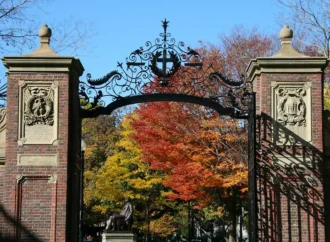One of the central plots in Lucy Maud Montgomery’s Anne of Green Gables concerns the fractious relationship between Anne Shirley and Gilbert Blythe. This friction primarily plays out in the classroom where Anne determines to get ahead of Gilbert in every subject even if it kills her:
“Now Gilbert was head of the spelling class; now Anne, with a toss of her long red braids, spelled him down. One morning Gilbert had all his sums done correctly and had his name written on the blackboard on the roll of honor; the next morning Anne, having wrestled wildly with decimals the entire evening before, would be first. … When the written examinations at the end of each month were held the suspense was terrible. The first month Gilbert came out three marks ahead. The second Anne beat him by five.”
While the rivalry between the two is amusing, it also conveys an important lesson: competition, combined with the honor of recognition, is a powerful motivator. The early competition between Anne and Gilbert undoubtedly helped further the success both enjoyed later in life.
But it appears that such competition is not appreciated in today’s schools. So much so, that many schools are getting rid of their valedictorian status. Education Week explains:
“About half of schools no longer report class rank, according to the National Association of Secondary School Principals. Administrators worry about the college prospects of students separated by large differences in class rank despite small differences in their GPAs, and view rankings as obsolete in an era of high expectations for every student, association spokesman Bob Farrace said. There are also concerns about intense, potentially unhealthy competition and students letting worries about rank drive their course selections.”
Given the push to get every student into college, the first two arguments toward abolishing valedictorian status may have some grounds. After all, every time society creates a mammoth organization, it must figure out ways to deal with the bureaucratic challenges that accompany it.
It’s the third argument, however, that is concerning. Yes, competition is stressful, and yes, it can increase worry and influence important choices; but it can also foster profound growth and confidence in a student. In the era of the participation trophy, such drive and ambition are rare.
But perhaps that has been the goal all along – to get rid of ambition and excellence in an effort to make everyone the same. As C.S. Lewis notes through his demon creation Screwtape, the abolishment of excellence is the goal of those who detest the true, the good, and the beautiful:
“What I want to fix your attention on is the vast, overall movement towards the discrediting, and finally the elimination, of every kind of human excellence – moral, cultural, social, or intellectual. …
The basic principle of the new education is to be that dunces and idlers must not be made to feel inferior to intelligent and industrious pupils. That would be ‘undemocratic’. These differences between the pupils – for they are obviously and nakedly individual differences – must be disguised. …
In a word, we may reasonably hope for the virtual abolition of education when I’m as good as you has fully had its way. All incentives to learn and all penalties for not learning will vanish. The few who might want to learn will be prevented; who are they to overtop their fellows?”
Is the current quest to abolish the trophy of valedictorian playing right into the Screwtape ideal?
Image Credit: Ali Hanlon via Flickr bit.ly/1ryPA8o
















Leave a Comment
Your email address will not be published. Required fields are marked with *